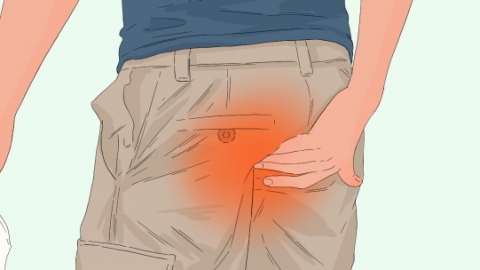What to do about itchy hemorrhoids
In general, itching caused by hemorrhoids may be due to inadequate local hygiene, friction from clothing, perianal eczema, bacterial infection associated with hemorrhoids, or fungal infection in the perianal area. It is recommended to seek medical attention promptly, identify the underlying cause, and then improve symptoms under a doctor's guidance through general measures, medication, and other treatments. Specific causes are analyzed as follows:

1. Inadequate local hygiene: Residual sweat, secretions, and feces around the anus can irritate the skin and cause itching. Clean the perianal area twice daily with warm water at 38–40 °C. After bowel movements, gently wipe with soft toilet paper—avoid vigorous rubbing—and allow the area to air dry or pat dry with a soft cloth.
2. Friction from clothing: Wearing tight synthetic underwear can repeatedly rub against hemorrhoids and perianal skin, worsening itching. Switch to loose-fitting, breathable cotton underwear, change it daily, and avoid tight garments that continuously irritate the perianal region.
3. Perianal eczema: Secretions from hemorrhoids may irritate the surrounding skin, triggering an allergic inflammatory reaction and leading to eczema, which may present with papules and exudation. Follow your doctor’s instructions to apply calamine lotion, hydrocortisone butyrate cream, or desonide cream to relieve itching.
4. Bacterial infection associated with hemorrhoids: When hemorrhoids become damaged, bacteria may invade and cause infection, resulting in inflammation and itching. After bowel movements, perform sitz baths with potassium permanganate solution, and apply mupirocin ointment, fusidic acid cream, or compound polymyxin B ointment as directed by your physician to control the infection.
5. Perianal fungal infection: The warm, moist environment around the anus is conducive to fungal growth, which can lead to infection and itching, often accompanied by white scales. Use antifungal medications such as miconazole nitrate cream, clotrimazole cream, or terbinafine hydrochloride cream as prescribed to inhibit fungal proliferation.
In daily life, avoid consuming spicy and irritating foods such as chili peppers and Sichuan pepper to reduce irritation to the perianal skin. Do not scratch the affected area with your hands, as this may break the skin and worsen infection. Eat more fiber-rich foods like celery and bananas to maintain regular bowel movements and minimize irritation to hemorrhoids.








